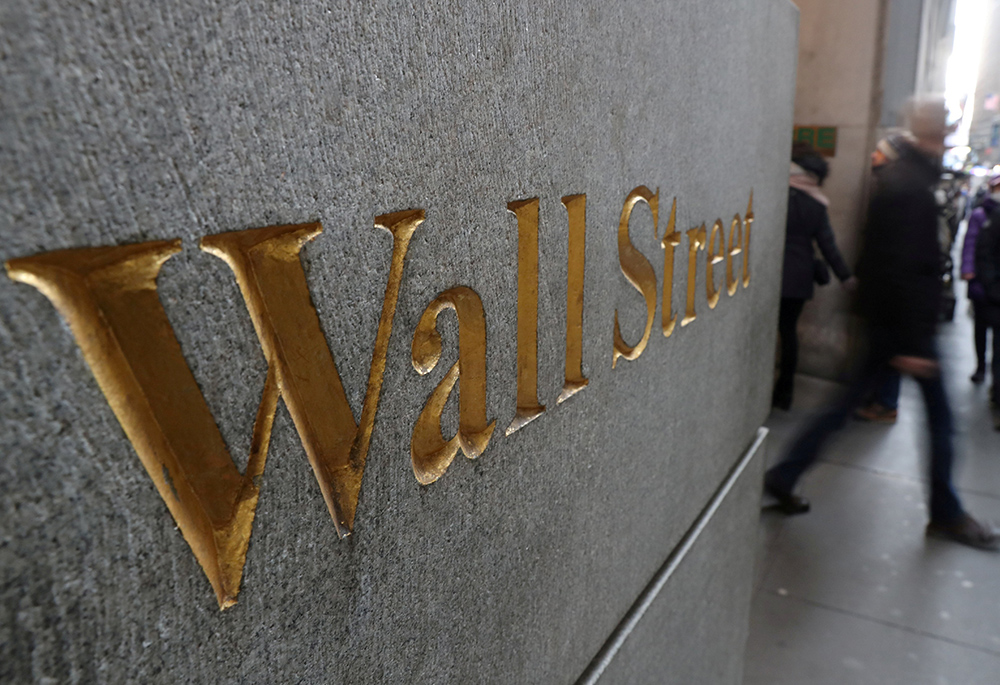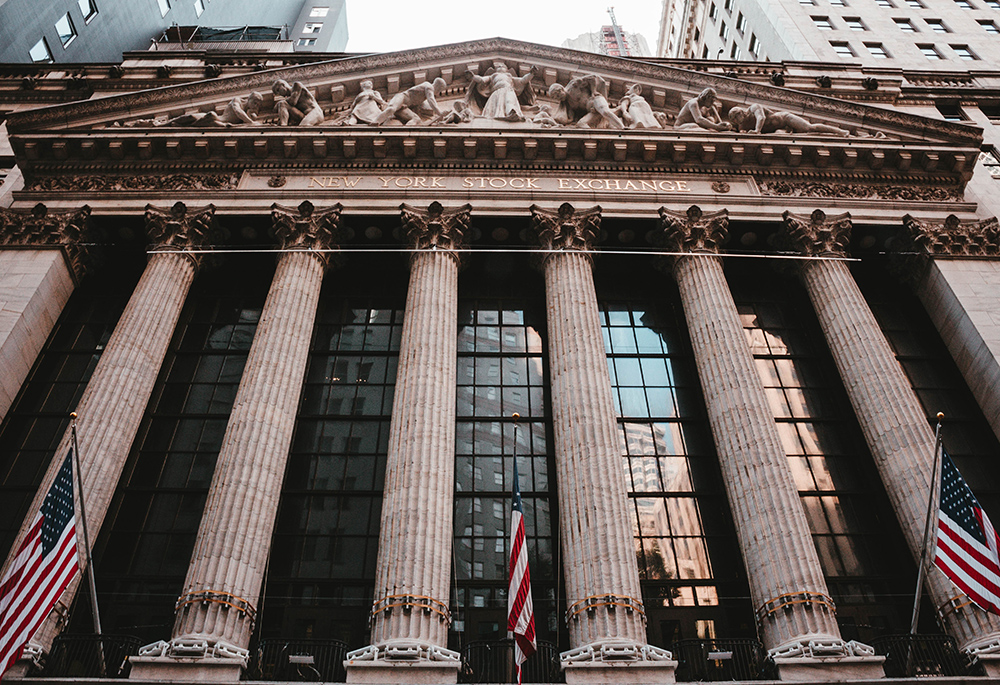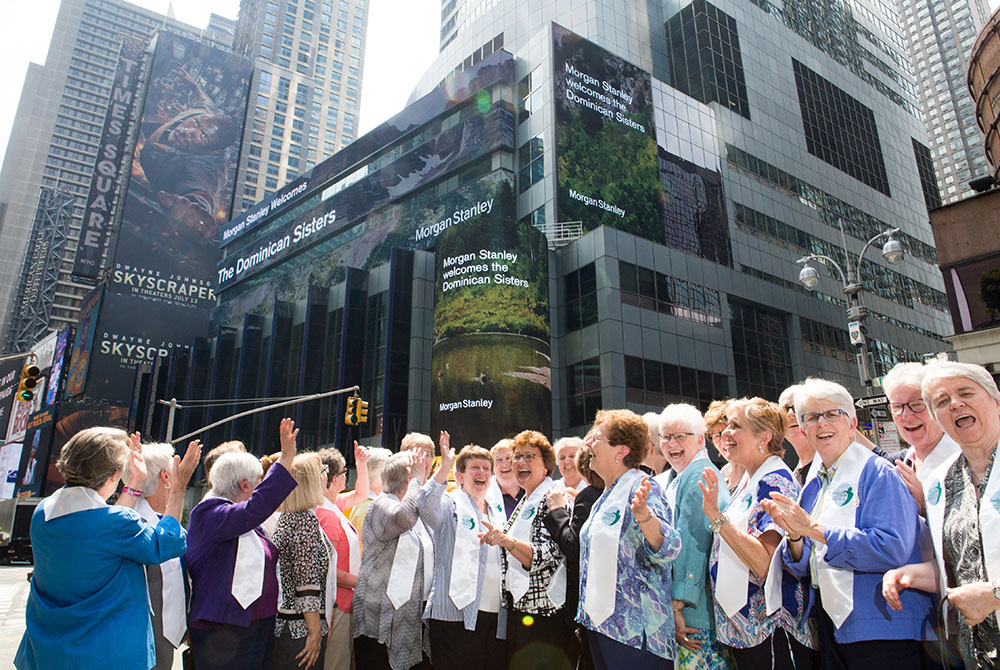
"Wall Street" is marked on a building outside the New York Stock Exchange in New York in this Jan. 3, 2019, file photo. (CNS/Reuters/Shannon Stapleton)
Catholic sisters continue to examine, revise and refine how their investments not only reflect their values but shape the world.
For 50 years, congregations have refused to invest in corporations whose business goes against Catholic social teaching — tobacco companies, pornography, gun manufacturers — and in recent decades began moving their investments into companies and funds that make a positive impact on the world.
Now, some are even using their money to change the investing landscape itself.
Suzanne Bernard, head of Not-for-Profit Outsourced Investment Solutions for Northern Trust Asset Management, said congregations of sisters have begun choosing their investment managers by the diversity of the ownership of the company those managers work for.
"We see faith-based investors — and particularly congregations of Catholic sisters — typically defining 'diversity' as the percentage ownership of their investment managers by diverse individuals (typically by race and/or being female)," Bernard said in an email interview. "This is usually based on a minimum percentage of ownership — typically being 33% or more."
But that measurement of diversity is too narrow, she said. Ownership is one measurement, but the diversity of the firm's employees, its community engagement, and the diversity of the companies and vendors it works with should all be measured, too.
"Ownership is a straightforward way to measure diversity," she wrote. "But if you care about encouraging diversity within your investment managers — be it for social reasons or because you believe it encourages better decisions over time — realize that if you focus solely on ownership, you are ignoring the diversity practices (or lack thereof) of the vast majority of investment managers."

(Unsplash/Aditya Vyas)
Choosing, for example, to do business only with investment managers that have a diverse staff could, over time, help make the investment management industry itself more diverse.
This is not just the right thing to do — it also results in better decisions: "In decision-making science, there is pretty strong evidence that if any decision-making group all has the same opinions and background — essentially being an echo chamber of thought — their collective decisions will be less innovative, less robust, and ultimately, less effective," she said.
Other congregations are putting more and more money into direct investments in projects and organizations advancing social and environmental goals, often through very low-interest loans.
Holy Cross Sr. Suzanne Brennan said that this kind of impact investing reflects congregations' desire to see their money actively make a difference, rather than simply not causing more harm.
"It was time to look at how we could positively invest our resources and achieve some social change," Brennan said. "We started with very, very small loans at the beginning, before we really re-examined our investing policy. But it was making an impact, and we thought we could do even more."
The first big project the congregation invested in was bringing drip irrigation to crops in an area of Peru that had not had water available before. Drip irrigation allows very precise watering of crops with a minimum of water lost to evaporation or over-spray; this project allowed Indigenous people to begin farming. When the loans in impact investing are repaid, the money can then be used to fund other projects.
Advertisement
"That first major project was so successful, it wasn't hard to do more after that," Brennan said.
And impact investing is changing, as well. Sr. Carol Lichtenberg, a Sister of Notre Dame de Namur of the Ohio Province, said that instead of being only direct loans to individual projects or organizations, impact investing now includes things like investing in credit unions in poorer neighborhoods or housing initiatives.
But these kinds of investments can also be a lot of work. A lot of research is required before any money changes hands, and the investment must be monitored and evaluated over its lifetime. That's where the Religious Communities Impact Fund comes in: A collaboration of 17 congregations of Catholic women religious, it functions like a mutual fund, where the fund's managers do the research and investments, while the members simply provide the funding.
"There's a multilevel administrative factor there, but the Religious Communities Impact Fund relieves that," Lichtenberg said. "The fund is set up to take all the congregational investments and pool them together."
Investments are also pooled together in the Climate Solutions Funds, a fund created by 16 Dominican congregations in partnership with banking company Morgan Stanley to fight climate change. The fund, now capitalized at more than $160 million, has a private investment option investing directly in companies the way venture capital firms do, and another that trades in public equities such as stocks and bonds. Like a mutual fund, the investments are chosen and traded by Morgan Stanley fund managers.

Leaders of 16 congregations of Dominican sisters visit Times Square and the Morgan Stanley headquarters in June 2018 to kick off the formation of their Climate Solutions Funds. (Courtesy of Morgan Stanley)
And this kind of investing does not mean you can never invest in certain sectors, Lichtenberg said. A blanket statement that says you will never invest in fossil fuel companies means not investing in companies that are changing away from fossil fuels to sustainable energy.
But not everyone is enamored of investments that protect the environment, workers' rights and promote corporate responsibility: Several states have prohibited public pension funds from investing based on the environment, social issues or corporate governance (known as ESG investing), and 25 states have sued the U.S. government for dropping a Trump-era rule that limited it. Conservatives in Congress passed a bill to make the prohibition law, but President Joe Biden vetoed it.
Amid the political rhetoric over "woke investing," there is also a continued belief that this type of investing results in lower returns. But Bernard said a meta study (a study of studies) on investing based on diversity measures in 2021 examined 46 studies over the prior decade and found almost half showed that more diversity improved performance and 40% found it had no effect. Only 13% showed lower performance.
"We're very woke," Lichtenberg said. "We're on the side of the poor, on the side of the environment, on the side of holding the very, very rich who run these corporations responsible, watching the pay scales and who's on the board, and yes, certain people are rejecting that."
Prohibiting investment decisions based on those factors "flies in the face of Gospel values," she said.
Sr. Sue Ernster, of the Franciscan Sisters of Perpetual Adoration, said socially conscious investing often matches market returns, and even when it doesn't, it is worth it to live your values.
"Pope Francis is asking us to disrupt the economy," Ernster said. "So how can we invest in a way that disrupts the current economy, which keeps people from participating? Our system is not equal for everything."
Lichtenberg called it a "double bottom line" because there are both financial and spiritual benefits. "If you have a moral compass, you do it," she said.








